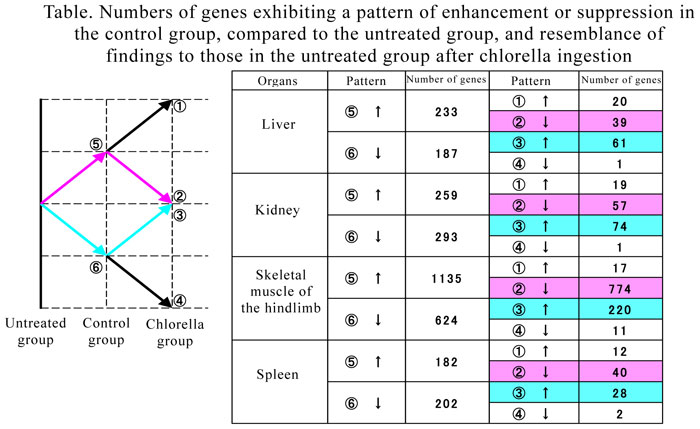- TOP
- List of reports
- Confirmation of Effects of Chlorella on Swimming Stress by Analyses of Genetic Expression
Confirmation of Effects of Chlorella on Swimming Stress by Analyses of Genetic Expression
【Scientific information】
Research and Development Department, Sun Chlorella Corporation
Confirmation of Effects of Chlorella on Swimming Stress by Analyses of Genetic Expression
Presented at the 5th Annual Meeting (2009) of the Japanese Association for Food Immunology
- Study Objectives
- It is known that stress can impair the balance of immune function and is related to various diseases including allergy. Therefore, prevention of daily stress is considered important, and one way of doing so involves the utilization of foods. Chlorella is a healthy food with a long time history as a food, and has been reported to be useful for hyperlipidemia, hypertension, and diabetes. At the Annual Meeting of the Society last year, we reported the anti-fatigue and immunomodulatory effects of chlorella in mice stress-loaded by swimming (data presented at the 4th Annual Meeting of the Japanese Association for Food Immunology). In this meeting, we presented findings obtained regarding the effect of chlorella on swimming-related stress, as we examined it from the aspect of gene expressions.
- Method and experiments
- Animals used for study were divided into 3 groups: a group in which animals were given basic food without swimming (untreated group), a group in which animals were given basic food and allowed to swim (control group), and a group in which animals were given food mixed with chlorella at 0.5% and allowed to swim. On Days 0, 4, 7, 10, and 14 after initiation of the study, animals were stressed by swimming until exhaustion. After swimming stress on Day 14, RNA was extracted from the liver, kidney, spleen, and skeletal muscle of the hindlimb, and exhaustive gene expression analyses were performed with a DNA microarray.
- Results
- On gene expression analyses, many genes with alteration of expression by swimming stress and chlorella ingestion were extracted. In the control group, expression of such genes was enhanced or suppressed compared to the untreated group. In the chlorella group, expression of many genes was similar to that in the untreated group, confirming the effect of chlorella ingestion on swimming stress. To estimate the function of genes for which alteration of expression was suppressed by chlorella, gene ontology analyses were performed in the skeletal muscle of the hindlimb, where marked changes in gene expression were observed. As a result, the effects of chlorella ingestion on the immune, redox, and vascular system were confirmed. These findings suggested that the anti-fatigue effect against swimming stress and immunomodulatory activity of chlorella were probably due to regulation of gene expression related to the immune and redox systems.

Presentation at a scientific meeting
- Name of meeting:
- The 5th Annual Meeting of the Japanese Association for Food Immunology
- Title:
- Effect of chlorella on swimming stress - Results of gene expression analyses
- Presenters:
- Mizoguchi Toru, Yukari Arakawa, and Masaki Fujishima
- Affiliation:
- Sun Chlorella Corporation





